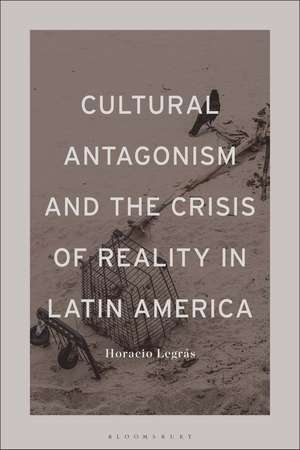Cultural Antagonism and the Crisis of Reality in Latin America
Autor Professor Horacio Legrásen Limba Engleză Paperback – 29 mai 2024
| Toate formatele și edițiile | Preț | Express |
|---|---|---|
| Paperback (1) | 189.80 lei 6-8 săpt. | |
| Bloomsbury Publishing – 29 mai 2024 | 189.80 lei 6-8 săpt. | |
| Hardback (1) | 508.95 lei 6-8 săpt. | |
| Bloomsbury Publishing – 2 noi 2022 | 508.95 lei 6-8 săpt. |
Preț: 189.80 lei
Preț vechi: 248.54 lei
-24% Nou
Puncte Express: 285
Preț estimativ în valută:
36.32€ • 37.52$ • 30.23£
36.32€ • 37.52$ • 30.23£
Carte tipărită la comandă
Livrare economică 25 martie-08 aprilie
Preluare comenzi: 021 569.72.76
Specificații
ISBN-13: 9781501392900
ISBN-10: 1501392905
Pagini: 192
Dimensiuni: 152 x 229 x 25 mm
Greutate: 0.26 kg
Editura: Bloomsbury Publishing
Colecția Bloomsbury Academic
Locul publicării:New York, United States
ISBN-10: 1501392905
Pagini: 192
Dimensiuni: 152 x 229 x 25 mm
Greutate: 0.26 kg
Editura: Bloomsbury Publishing
Colecția Bloomsbury Academic
Locul publicării:New York, United States
Caracteristici
Illuminates specific geographic areas, key areas of thought, and pressing questions that all reflect the complexities and variations of the real Latin America
Notă biografică
Horacio Legrás is a Professor in the Spanish and Portuguese Department at University of California, Irvine, USA. He is the author of Literature and Subjection: The Economy of Writing and Marginality in Latin America (2008) and Culture and Revolution: Violence, Memory and the Making of Modern Mexico (2017) and over 50 articles in peer-reviewed journals.
Cuprins
AcknowledgmentsPreface1. The Nativist Avant-Grade2. Miguel Angel Asturias: The Science of Literature3. Seeing Women Photographed in Revolutionary Mexico4. The Dialectic of Diasporic Consciousness: The Afro-Cuban Voice and the Hypostasis of Meaning5.José María Arguedas: Capitalist Accumulation and Novelistic Mode of Presentation in the Andes6. Psychotic Violence: Crime and Consumption in the Apocalyptic Phase of CapitalismWorks CitedIndex
Recenzii
Legras is one of the most insightful and brilliant scholars of Latin American arts and literature today. Combining cultural-political history, textual and visual analysis, critical theory and psychoanalysis, this book works through the place of antagonism in Latin American modernity. Legras understands antagonism as the event whose emergence rearranges the Latin American real, and art and literature as the discursive sites where the contours of out-of-joint marginalized collective subjects can be traced and interrogated in the very act of dislocating the totalizing fictions put forth by the institutions that sustain the pretense of society as an objective, shared reality. This is an extraordinarily illuminating andintelligent book; it proves that theory can still be deployed as an intempestive form of historical imagination to intervene in the most urgent debates of the present.
Cultural Antagonism reframes the question at the core of Latin American subaltern studies-'Can the Subaltern Speak?'-by creating a space for the voice of untimely pasts. Legrás's generative readings listen 'for the real in reality,' showing us again and again how existence escapes capitalism. This book is a brilliant and necessary intervention showing us how and why to read in the present."
Cultural Antagonism is an original and sophisticated intervention in longstanding debates related to race, representation and social antagonism in Latin America. Legrás's theoretical engagement with sciences, technologies and genres of representation of reality-anthropology, photography, testimonio-provides a methodological and conceptual guide to reconsider the region's relationship between cultural forms and the political.
Cultural Antagonism reframes the question at the core of Latin American subaltern studies-'Can the Subaltern Speak?'-by creating a space for the voice of untimely pasts. Legrás's generative readings listen 'for the real in reality,' showing us again and again how existence escapes capitalism. This book is a brilliant and necessary intervention showing us how and why to read in the present."
Cultural Antagonism is an original and sophisticated intervention in longstanding debates related to race, representation and social antagonism in Latin America. Legrás's theoretical engagement with sciences, technologies and genres of representation of reality-anthropology, photography, testimonio-provides a methodological and conceptual guide to reconsider the region's relationship between cultural forms and the political.
